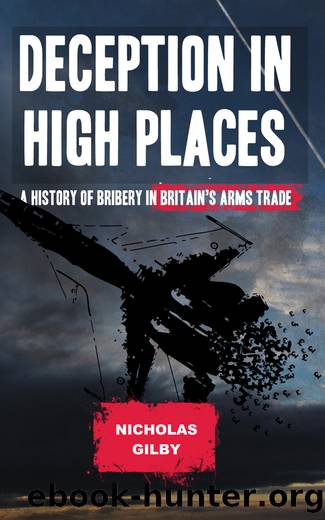Deception in High Places by Gilby Nicholas;

Author:Gilby, Nicholas;
Language: eng
Format: epub
Publisher: Pluto Press
Britain is Isolated in International Discussions
By the summer of 1977, the Working Group had met four times, and produced an early draft of an agreement to âprevent and eliminate illicit paymentsâ.50 The Americans lobbied for a Diplomatic Conference to finalise it. British officials worried that their passive approach was unsustainable as they would eventually have to decide whether or not to support the agreement.51 One wrote âthe UKâs position will be bearly credable [sic] if we can support only an agreement which goes no further than the provisions of existing domestic lawâ.
At the third G7 summit in early May 1977, the leaders of Britain, America, France, West Germany, Italy, Japan, and Canada agreed52 that âirregular practices and improper conduct should be eliminated from international trade, banking and commerceâ. However, shortly afterwards senior Ministers met at Chequers to discuss the Daily Mail allegations about British Leyland. Callaghan said53 that âgiven the heavy reliance of the British economy on exports, it might be more difficult for us to accept as high standards in this matter as, for instance, the Americansâ.
At the 1977 meeting of ECOSOC,54 the Working Group was given until mid 1978 to finalise an agreement. British officials anticipated becoming full members of the Working Group. Now the British Leyland affair had raised the political temperature, Dell told officials55 to âplay a more active partâ and âconsider positive initiativesâ. Ministers agreed56 that âstrong efforts should be made to achieve effective international actionâ.
The Americans agreed to drop their proposal that companies should disclose agentsâ commissions (now absent from the bill going through Congress).57 But Ministers still had to decide whether to propose to Parliament a change in Britainâs corruption laws so they would apply to British nationals and companies when overseas. Generally, the law in England and Wales is âterritorialâ, following the long-accepted convention that each state regulates by law the conduct of those within its own territory and no other. It is much easier and quicker to obtain evidence and deal with cases if they are tried in the country where the crime was committed. In 1977, it was accepted that a British national or company paying a bribe while overseas could not be prosecuted in Britain, nor could someone in Britain who attempted, aided, abetted or procured an offence of bribery committed overseas be prosecuted in Britain.58 But British citizens taking or paying a bribe in Britain (like David Randel and Frank Nurdin) could be prosecuted.
Dell told Callaghan59 he did not want any extension of British jurisdiction overseas or change in Britainâs corruption laws. Officials thought prosecuting British nationals or companies would be unfair if the bribe recipients were not prosecuted too. Dell also opposed the disclosure of commissions. So that Britain had something positive to say, he suggested advocating the negotiation of bilateral agreements with individual countries to deal with corruption.
When the Ministerial Group on Improper Trade Practices met in late October 1977, Silkin and Industry Secretary Eric Varley thought60 that the American proposal might be politically necessary before long.
Download
This site does not store any files on its server. We only index and link to content provided by other sites. Please contact the content providers to delete copyright contents if any and email us, we'll remove relevant links or contents immediately.
The Vikings: Conquering England, France, and Ireland by Wernick Robert(79228)
Ali Pasha, Lion of Ioannina by Eugenia Russell & Eugenia Russell(39945)
The Conquerors (The Winning of America Series Book 3) by Eckert Allan W(36855)
The Vikings: Discoverers of a New World by Wernick Robert(36833)
Cecilia; Or, Memoirs of an Heiress — Volume 1 by Fanny Burney(32098)
Cecilia; Or, Memoirs of an Heiress — Volume 3 by Fanny Burney(31491)
Cecilia; Or, Memoirs of an Heiress — Volume 2 by Fanny Burney(31439)
Empire of the Sikhs by Patwant Singh(22783)
Hans Sturm: A Soldier's Odyssey on the Eastern Front by Gordon Williamson(18343)
The Secret History by Donna Tartt(18276)
Cat's cradle by Kurt Vonnegut(14811)
Sapiens: A Brief History of Humankind by Yuval Noah Harari(14013)
Pimp by Iceberg Slim(13830)
Talking to Strangers by Malcolm Gladwell(12926)
Norse Mythology by Gaiman Neil(12887)
Leonardo da Vinci by Walter Isaacson(12839)
Underground: A Human History of the Worlds Beneath Our Feet by Will Hunt(11862)
4 3 2 1: A Novel by Paul Auster(11849)
The Radium Girls by Kate Moore(11656)
